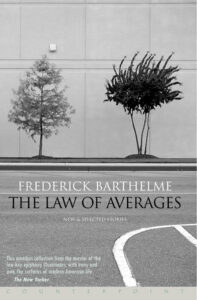Frederick Barthelme
Frederick Barthelme was a founding member, with Mayo Thompson, of the art/noise/psychedelic rock band Red Krayola, and a painter and conceptual artist in Houston and New York in the late 1960s. He has published fiction and nonfiction in Fiction, Epoch, GQ, Ploughshares, Playboy, Esquire, TriQuarterly, North American Review, The New York Times, Frank, The Southern Review, The Boston Globe Magazine, and elsewhere. The memoir, Double Down: Reflections on Gambling and Loss, was co-authored with his brother Steven, and was a New York Times Notable Book of the Year. The same honor was awarded his retrospective collection of stories, The Law of Averages and his novel Elroy Nights, which was also one of five finalists for the 2004 PEN/Faulkner Award. In 2009 he published Waveland, a novel set on the Mississippi Gulf Coast a year after Katrina. In 2010 he won the Mississippi Institute of Arts and Letters Award for Fiction.
Books
Law of Averages
Twenty years ago Frederick Barthelme began publishing stories that turned readers' expectations on their heads. In The New Yorker, Esquire, GQ, and elsewhere he published story after story that confounded the prevailing literary assumptions, treating our very ordinary lives with a new kind of careful and loving attention and imagination. He wrote intimate, funny, odd, detailed, laugh-out-loud stories about relationships that almost happen and ones that almost don't, about the ways we look at each other when we mean things we cannot bring ourselves to say.Before there were slackers, or kids in parking lots, or stories that took the mundane seriously, there were these prescient stories by Frederick Barthelme. He took a post-ironic stance before the post-ironic had a name. He took fiction where few were then willing to go, took as his subject small romances, private fears, suburban estrangement, office angst, cultural isolation, apparently insignificant humiliations, and the growing information surplus (CNN is a sociological novel, he once remarked). He wrote--and continues to write--with a laser-surgery precision that stuns and delights both readers and critics. If he arrived at the new-literature party a little earlier than the other guests, he has not left early, and is thus well represented in The Law of Averages, with old and new stories side by side, ready to give up their abundant pleasures.
Natural Selection
Peter Wexler is 40 and obsessed with what's wrong in the world, including his marriage. Deciding that a change of scenery might help, Peter leaves his wife and their son in search of a resolution to the confusion, estrangement, fatigue, and adultery that have confounded his life.
Catapult | Counterpoint | Soft Skull
20 Jay Street #704
Brooklyn, NY 11201
646.926.0805 | contact@catapult.co






